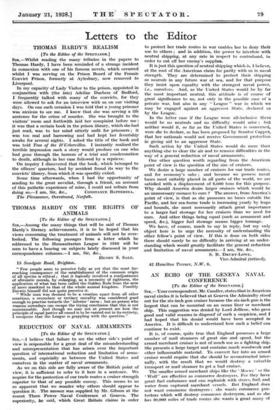REDUCTION OF NAVAL ARMAMENTS
[To flee Editor of the SPECTATOR.]
believe that failure to see the other side's point of view is responsible for a great deal of the misunderstanding and misrepresentation that has arisen over the important question of international reduction and limitation of arma- ments, and especially as between the United States and ourselves in the matter of naval armaments.
As we on this side are fully aware of the British point of view, it is sufficient to refer to it here in a sentence. We require for the protection of our trade mutes a cruiser strength superior to 'that of any possible enemy. This seems to us so apparent that we .wonder why others should appear to qnestion it. The answer was supplied by Mr. Gibson at the recent Three Power Naval Conference at Geneva. The superiority, he said, which Great Britain claims in order
to protect her trade routes in war enables her to deny their use to others ; and in addition, the power to interfere with neutral shipping, at any rate in respect to contraband, in order to cut off her enemy's supplies.
It is just this question of neutral shipping which is, I believe,
at the root of the American claim for parity with us in naval strength. They are determined to protect their shipping as neutrals in any future war at sea, and for that purpose they insist upon equality with the strongest naval power, i.e., ourselves. And, as the United States would be by far the most important neutral, this attitude is of course of great significance to us, not only in the possible case of a private war, but also in any " League " war in which we may be engaged against an aggressor State, declared so by the League.
In the latter case if the League were all-inclusive there would be no neutrals and no difficulty would arise ; but neither would it, so far as the United States is concerned, were she to declare, as has been proposed by Senator Capper, that her nationals would not receive Government protection in giving aid to an aggressor State.
Such action by the United States would do more than anything else to clear the air and to remove difficulties in the way of a general reduction of naval armaments.
One other question worth regarding from the American point of view is the question of the size of cruisers.
We desire a large number of cruisers for our trade routes, and for economy's sake ; and because we possess naval bases most suitably placed in all parts of the world, we are satisfied with a displacement of 6,000 tons for this purpose. Why should America desire larger cruisers which would be an unnecessary menace to ours ? The answer, from America's point of view, is that as she possesses no bases outside the Pacific, and her sea-borne trade is increasing yearly by leaps and 'bounds, she must necessarily attach great importance to a larger fuel stowage for her cruisers than we need for ours. And other things being equal (such as armament and speed, &c.), bigger fuel stowage means bigger tonnage.
We have, of course, much to say in reply, but my only object here is to urge the necessity of understanding the other fellow's point of view. If this is done on both sides there should surely be no difficulty in arriving at an under- standing which would greatly facilitate the general reduction and limitation of naval armaments.--I am, Sir, &c.,
S. R. DRURY-LOWE, Vice-Admiral (retired).
42 Hamilton Terrace, N.W. 8.






































 Previous page
Previous page